Sat 18 June 09:00
-
09:00 - 09:45 Oper - Probebühne 3
Challenging Conversations
Warm-upIn this mind-up, Rivca Rubin conveys in a concrete and practical way how one can respond to problematic communicative situations and arrive at positive results and mutual agreements despite resistances. The exercises are suitable for superiors, friends or mediators involved in the conflicts of others or who want to or must intervene from the outside.
Warm-up
Rivca Rubin (UK) trainer, coach
-
09:00 - 09:45 Oper - Großer Ballettsaal
Prevention and Warm-Up Training
Warm-upDo older dancers require special dance training? The DANCE ON Ensemble for dancers 40-plus has invited the sports scientist Patrick Rump to answer this question with us. Rump and his team of the GJUUM Group have already developed measures for prevention, rehabilitation, and performance enhancement with internationally renowned dance companies such as the Forsythe Company and the Royal Ballet. For the Dance Congress, Patrick Rump offers a specially conceived prevention and warm-up training to strengthen the muscles of the ankles, knees, hips, shoulders, and spine.
Patrick Rump (DE) sports scholar
-
09:00 - 09:45 Oper - Kleiner Ballettsaal
Vinyasa Flow Yoga
Warm-up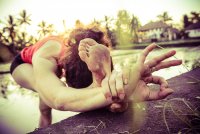 © Heather Bonker
© Heather BonkerThe dynamic yoga style Vinyasa Flow is regarded as 'meditation in motion' and combines movement and breathing to a flowing experience. The focus of the morning yoga practice lies on both the precise orientation of different physically and mentally challenging body positions (Asanas) and the harmonious flow of movements between one Asana and the next. Vinyasa Flow Yoga enhances body awareness, energy, flexibility, and concentration, and is the ideal way to start the day.
Warm-up
Please bring your yoga matMichèle Stéphanie Seydoux (DE) dancer, yoga teacher
Sat 18 June 10:00
-
10:00 - 10:45 Künstlerhaus - Kino
Releasing the archive
Presentation, Talk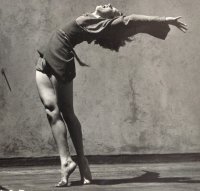 © Margaret Michaelis
© Margaret MichaelisThe contribution 'Releasing the Archive' with an artists' talk and the subsequent workshop 'Experimental clinic for choreographic reanimation attempts' sees itself within the field of experimentation where the body knowledge of the Viennese dance avant-garde of the 1920s and 1930s is to be reanimated and transformed.
In an artists' talk, Carol Brown and Thomas Kampe present their joint research project 'Releasing the Archive' initiated in December 2015 in collaboration with the New Zealand Dance Company in Auckland. It is dedicated to the possibilities that make the somatic basics of Viennese Ausdruckstanz of the 1920s and 1930s accessible and usable for the present. Based on video documentations of their research as well as historical texts and images, the potential of these hitherto under researched body practices for contemporary dance and also for a future 'ethics of the body' is to be analyzed.
In the workshop, the connections between the Ausdruckstanz movement in Vienna in the years between the world wars and its continuation in Australia by the emigrant Jewish choreographer Gertrud Bodenwieser from the 1940s onward will be practically examined. Participants experiment with the basics of Gertrud Bodenwieser's dance techniques, who had in turn been influenced by the pedagogical ideas of Bess Mensendieck on the female self-perception of posture and movement. The Feldenkrais method is used to connect the somatic practices of the past with the bodies of the dancers shaped by contemporary training techniques.
Both contributions are developed alongside the following guiding questions: To what extent do one's own experiences with migration and exile influence the relationships to body cultures of the past? What can the somatic basics of Ausdruckstanz provide for the future? How does the appropriation of these past methods influence present-day bodies?as well as:
Workshop
Sat 18 June, 11:15 – 14:15, Oper - Probebühne 3
Registration requiredCarol Brown (NZ) choreographer, performer
Thomas Kampe (UK) performer, teacher
Carol Brown's visit is supported by the University of Auckland Faculty Research and Development Fund. -
10:00 - 11:00 Schauspiel - Bühne
Choreography and conflict
Impulse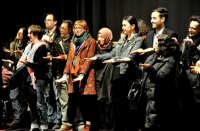 © Marion Borriss
© Marion Borriss‘Conflict is not only a place of possibility, but the origin of all creative action.’ (Dana Caspersen)
This focus takes interest in how conflict and crisis challenge and are challenged by choreography as a practice and a conceptual framework. In her lecture and workshop, the dancer and conflict specialist Dana Caspersen focuses on the power of the individual to affect positive change in destructive systems. This interactive event offers participants a glimpse into the physicalized methodologies that Caspersen has developed for learning, experiencing and creating change in conflicts ranging from inter-personal to international. The impulse lecture by choreographer and performer Arkadi Zaides draws on his artistic work on the political and social situation in Israel/Palestine. By engaging in physical reactions and actions, which result in confrontational situations, he poses critical questions of participation and responsibility in his artistic practice.
In english with simultaneous translation
as well as:
Workshop
Sat 18 June, 16:00 - 18:30, Oper - Großer Ballettsaal
Registration requiredDana Caspersen (US) conflict specialist, author, performing artist
Arkadi Zaides (IL) choreographer, performer -
10:00 - 11:00 Oper - Großer Ballettsaal
Dance on?!
© Dorothea Tuch
What happens when dancers older than age 40 do not stop dancing? How do they train and perform? Do choreographers work differently with older dancers than with younger ones? What does the audience and what does the art form gain when older dancers can contribute their treasure trove of experience to the creation of dance productions?
The six members of the dance company DANCE ON founded in 2015 can answer these questions, since they are all older than 40. Together with renowned choreographers such as William Forsythe, Rabih Mroué, Matteo Fargion, and Kat Válastur they are working not only on a new repertory for seasoned dancers, but also on a future in which age no longer play a role in dance.
The initiators and dancers of dance on will discuss what this entails, what their daily work in the studio looks like and which specific training techniques they develop, together with the sports scientist patrick rump, whose preventive training one can familiarize oneself with during the warm-up.DANCE ON is a project of DIEHL+RITTER supported by the Federal Goverment Commissioner for Culture and the Media.
Riccarda Herre (DE) project coordinator DANCE ON
Madeline Ritter (DE) artistic director DANCE ON
Brit Rodemund (DE) dancer
Christopher Roman (US) artistitc director DANCE ON (instead of Ty Boomershine and Jone San Martin)
Patrick Rump (DE) sports scientist -
10:00 - 11:30 Cumberlandsche Bühne
The precarity of contemporary bodies
Butoh's Urban Migration, Contamination, and Ruins
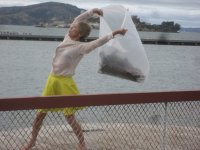 © Katherine Mezur
© Katherine MezurMass migration movements, wars, and climate changes characterize our present times as an endangered, precarious, and constantly changing state. Against this background, the notion of contemporaneity – grasped as a dynamic movement between the past and the future – is equally imbued by tensions and
points of friction.
Butoh dance has always dealt with moments of 'being inbetween', with the experience of marginality and precariousness, and in doing so has developed artistic methods that work with rebellion, contradictions, and extreme imagination.
In a physical workshop, a presentation, and a subsequent discussion, Butoh and related techniques will be examined with regard to their critical relation to a present and a widespread reality of artistic existence experienced as 'precarious.'Physical workshop, Presentation, Talk
Please bring comfortable clothesYuko Kaseki (JP/DE) dancer, choreographer
Katherine Mezur (GB) dance and theatre scholar -
10:00 - 13:00 Oper - Probebühne 2
Critique Light? Or: What is your Discourse?
Confronting the Institutionalization of Theory in Contemporary Dance Education
Since the 1990s, the readiness and ability to engage in discourse, self-critique, and regarding one’s own work as a ‘critical practice’ are omnipresent not only in dance and performance; they are also formulated as concrete expectations toward young artists in the frame of new european education programmes. Although (former) BA and MA students and lecturers share a strong need to integrate theory in art education, they are also concerned with the doubts and questions in their practice: has the development towards a ‘critical practice’ replaced the understanding of dance based on parameters such as skill and virtuosity? Does this possibly result in simply introducing a new canon? What role in the positing of ‘dance as critical practice’ do neoliberal perspectives play when used as propaganda or as an argument of self-realization and/or emancipation?
Critical interrogation
Johanna Ackva (DE) student HZT Berlin
Maayan Danoch (IL) choreographer, dance scholar HfMT Köln
Cathryn Humphreys (SE) student DOCH Stockholm
Yuebing Luo (CN) choreographer, performer, student HZT Berlin
Boyan Manchev (BG) philosopher, lecturer HZT Berlin
Constanze Schellow (DE) dance scholar HZT Berlin
Martin Sonderkamp (DE) dance researcher, lecturer HfMT Köln -
10:00 - 13:00 Künstlerhaus - Jo-Jo Saal
De-Colonizing Dance: Postcoloniality and Contemporaneity
Part I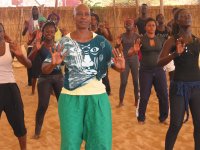
(Dance) Art from African countries is 'en vogue'. Due to a remarkable number of funding programmes, the market for artistic coproduction projects between African and German artists is booming. One of the most frequent application criteria is to develop a concept based on 'equal cooperation.' Yet 'cooperation' beyond the formal performance of one's duties can only arise, if (post-)colonial imaginations are radically called into question and made an issue. The question is what cooperation looks like – in both political and artistic terms. What are the aesthetic and discursive practices of (dance) cultural translation? What does the concept of 'contemporary' mean in the context of global and postcolonial dance cultures? Together with the choreographers Germaine Acogny (Senegal) and Mamela Nyamza (South Africa), participants can test an applied discourse on the decolonization of dance within the frame of a research lab.
Research lab
Registration required
as well as:
Part II
Sat 18 June, 14:00 - 17:00, Künstlerhaus - Jo-Jo SaalGermaine Acogny (SN) choreographer, dancer
Claude Jansen (DE) dance scholar
Gabriele Klein (DE) dance scholar, sociologist
Mamela Nyamza (ZA) choreographer, dancer
Sat 18 June 11:00
-
11:00 - 12:30 Oper - Bühne
Dialogic Movement: an Episode on Contemporaneity
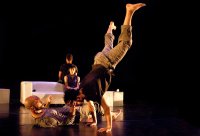 © Anastasya Stolyarov
© Anastasya StolyarovIn 2013, the choreographers Louise Wagner and Raphael Hillebrand initiated in cooperation with Niels „Storm" Robitzky the successful event series ‘Dialogic Movement’ during which new constellations of protagonists from so-called ‘urban’ and ‘contemporary’ dance meet on a regular basis. For the Dance Congress, they have created a special edition dedicated to questions of contemporaneity: In work presentations, jams, and talks, Steen Koerner, Christian Zacharas alias Robozee, Christian Loclair alias Mio, Frank Willens, and Richard Siegal will encounter each other for the first time. The dancers and choreographers enter into a physical and verbal exchange on different movement languages and approaches, as well as on themes such as ‘performance in an urban context’ and ‘the connection between dance and technology.’
Performance lecture, Talk
Dialogic Movement
Louise Wagner (DE) artistic direction, moderation
Raphael Hillebrand (DE) artistic direction, moderation
Annett Hardegen (DE) production managerGuests
Steen Koerner (DK) choreographer, director, master in electric Boogie
Christian ‚Mio’ Loclair (DE) media artist, choreographer
Richard Siegal (DE/FRA) dancer, choreographer
Frank Willens (DE) dancer, choreographer
Christian ‚Robozee‘ Zacharas (DE) dancer -
11:00 - 13:00 Schauspiel - Probebühne
Ethics of decision making
The salon ‘Ethics of Decision Making’ deals with the complex relationship between artists and the market. Guests from various institutional and independent fields within the contemporary dance scene discuss the relationships between educational insti- tutions, artists, production structures, and funding institutions. Who decides in which way, where, and for what reason? Which dependencies exist, which only pretend to, which are ignored, and which are even covered up? Don’t all persons involved as accomplices of this system apply their specific ethics of deciding? And how do these diverse decisions made at different levels impact the development of the contents and aesthetics? With the aim of jointly developing alternative decision-making processes, or effecting potential changes in the systems, the interdependencies of the various actors are to be analyzed and hidden interrelations identified.
Discussion
Gabi Beier (DE) artistic direction ada studio
Kristin de Groot (NL) artistic direction Dansatelier Rotterdam
Ingo Diehl (DE) professor MA CoDe
Kerstin Evert (DE) director K3 – Centre for Choreography
Claudia Feest (DE) jurywoman, mentor, dance pedagogue
Kirsten Haß (DE) head of programme department German Federal Cultural Foundation
Anna-Maija Mertens (DE) CEO Transparency International Germany
Matthias Quabbe (DE) dramaturge K3 – Centre for Choreography
Claudia Rosiny (CH) dance- and media scholar, curator
Mareike Uhl (DE) project direction tanzlabor 21
Kat Válastur (DE) choreographer, artist -
11:15 - 14:15 Oper - Probebühne 3
Releasing the archive
Workshop © Margaret Michaelis
© Margaret MichaelisThe contribution 'Releasing the Archive' with an artists' talk and the subsequent workshop 'Experimental clinic for choreographic reanimation attempts' sees itself within the field of experimentation where the body knowledge of the Viennese dance avant-garde of the 1920s and 1930s is to be reanimated and transformed.
In an artists' talk, Carol Brown and Thomas Kampe present their joint research project 'Releasing the Archive' initiated in December 2015 in collaboration with the New Zealand Dance Company in Auckland. It is dedicated to the possibilities that make the somatic basics of Viennese Ausdruckstanz of the 1920s and 1930s accessible and usable for the present. Based on video documentations of their research as well as historical texts and images, the potential of these hitherto under researched body practices for contemporary dance and also for a future 'ethics of the body' is to be analyzed.
In the workshop, the connections between the Ausdruckstanz movement in Vienna in the years between the world wars and its continuation in Australia by the emigrant Jewish choreographer Gertrud Bodenwieser from the 1940s onward will be practically examined. Participants experiment with the basics of Gertrud Bodenwieser's dance techniques, who had in turn been influenced by the pedagogical ideas of Bess Mensendieck on the female self-perception of posture and movement. The Feldenkrais method is used to connect the somatic practices of the past with the bodies of the dancers shaped by contemporary training techniques.
Both contributions are developed alongside the following guiding questions: To what extent do one's own experiences with migration and exile influence the relationships to body cultures of the past? What can the somatic basics of Ausdruckstanz provide for the future? How does the appropriation of these past methods influence present-day bodies?as well as:
Presentation, Talk
Sat 18 June, 10:00 – 10:45, Künstlerhaus – KinoCarol Brown (NZ) choreographer, performer
Thomas Kampe (UK) performer, teacher
Carol Brown's visit is supported by the University of Auckland Faculty Research and Development Fund. -
11:30 - 12:30 Schauspiel - Bühne
The Body's agency in bordering processes
ImpulseThe relation between artistic and social as well as civic and political movements and practices has been formative for the field of choreography as well as the field of border studies. The dancer Chrysa Parkinson and the philosopher Tomislav Medak dedicate their contribution to the question of the body's agency in bordering processes. Chrysa Parkinson proposes to look at a border that is created in every artistic process: the border between the creation of movement and its appropriation or reproduction. Tomislav Medak will discuss examples of how dance developed within capitalist modernity: While the bodies of workers were subjected to the discipline of machines, modern dance constituted its claim to autonomy around the expressive capacities of a freed body. The contribution follows the assumption that dance today faces the challenge of establishing a distance to the binary understanding of an 'inside' and 'outside' and newly seek resistance.
In English with simultaneous translation
as well as:
Workshop
Sat 18 June, 16:00 – 18:30, Schauspiel – ProbebühneTomislav Medak (RS) philosopher, artist
Chrysa Parkinson (SE) dancer
Sat 18 June 13:00
-
13:00 - 15:30 Oper - Großer Ballettsaal
Performing borders: Vulnerability, citizenship, and the body
WorkshopIn this encounter, cultural sociologist Gurur Ertem and artist Tom Tlalim bring the discussion to the proposition that our bodies are themselves sites of power. Tlalim looks at how we learn, memorize, and enact in our subject-citizenship in both body and voice: Through moving, exploring and bringing our body into action we can access and evoke memories that otherwise would not have been available, and thus partake in the creation of the state apparatus in a different way. Ertem focuses on vulnerability in dance, underscoring its ethical and political salience. In her reading, vulnerability entails openness to being affected and affecting, as a basis for learning, empathy, connection, and community. It is through vulnerability as a process of exposure to the unfamiliar, uncontrollable, and uncomfortable that one can extend oneself beyond oneself, renouncing barriers.
as well as:
Impulse
Fri 17 June, 15:30 – 16:30, Schauspiel – Bühne
In English with simultaneous translation
Gurur Ertem (TR) cultural sociologist, curator
Tom Tlalim (UK) researcher, sound artist -
13:15 - 13:45 Oper - Kleiner Ballettsaal & Schauspiel - Probebühne
Physical Explorations
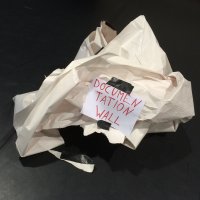
During the lunch break, interested persons and movement-hungry Congress participants are cordially invited to physically test historical and contemporary training approaches in dance. Students of the master study course Contemporary Dance Education, MA CoDE, at the Frankfurt University of Music and Performing Arts (HfMD K) give practical insights into techniques of Ausdruckstanz, modern dance, and other historical and contemporary styles, as well as hybrid forms of different practices. Beyond a traditional, linear understanding of history and a mainly didactical orientation, open approaches to passing on enable a playful engagement with movement and dance.
Physical Workshop (2 parallel)
with Ilana Reynolds, Oper – Kleiner Ballettsaal
This physical exploration is inspired through and informed by the work of Katherine Dunham. Through grounding the feet and energizing the spine, we ease ourselves into a sense of rhythm. This cadence, traveling along and through the different articulations of the body, guides our dancing into space and with each other.as well as:
Fri 17 June, 13:15 - 13:45
with Veronica Garzon, Oper – Kleiner Ballettsaal
with Julia Kathriner, Schauspiel – ProbebühneSon 19 June, 13:15 - 13:45
with Katarzyna Ustowska, Oper – Großer Ballettsaal
with Britta Schönbrunn, Cumberlandsche BühneVerónica Garzón (ES), Julia Kathriner (CH), Ilana Reynolds (US), Leonardo Rodrigues (BR), Britta Schönbrunn (DE), Katarzyna Ustowska (PL) dancers, students MA CoDE
Ingo Diehl (DE) professor MA CoDE
Susanne Triebel (DE) coordinator, teacher MA CoDE
Sat 18 June 14:00
-
14:00 - 15:30 Schauspiel - Bühne
Traversing the contemporary
Intertwined Practices of Contemporary Dance in Germany
Two choreographers, one interest: Johanna Devi and Sandra Chatterjee are both engaged with the connection between contemporary Euro-American dance techniques and the movement languages of classical dances from India. In a dialogic lecture performance they will introduce their choreographic work based on concrete examples. Afterwards, the two will discuss their aesthetic affinity as well as the differences between the identities assigned to them due to their origins.
In the second part of the event, Claudia Jeschke and Sandra Chatterjee will discuss the relevance of migratory identities in 'modern' European dance of the 1920s and 1930s based on the example of the Indian choreographer Uday Shankar and his Russian colleague Alexander Sacharoff. How exclusive is the aesthetic category of 'the contemporary' in (continental) European dance? Which past does contemporary work take up, and from which does it set itself apart?Lecture performance, Talk
Sandra Chatterjee (DE) choreographer, cultural scholar
Johanna Devi (DE) dancer, choreographer -
14:00 - 15:30 Cumberlandsche Bühne
Working practices - here and now
The discussion between a dance historian, choreographer, and journalist focuses on the artistic scene in Athens under the current sociopolitical conditions, and on the project ‘Collective Choreography’ by Greek choreographer Mariela Nestora. Concern with ‘continuous presentness’ becomes a methodological tool to open up a discourse on modes and conditions of working. What are the conditions of contemporaneity and its forms of artistic production? And if one understands contemporaneity as a continuous context of meaning in which ever new artistic and social spaces are opened: How can a collective artistic practice contribute something to it?
Discussion
Mariela Nestora (GR) choreographer
Betina Panagiotara (GR/UK) dance researcher, journalist
Steriani Tsintziloni (UK) dance historian -
14:00 - 16:00 Schauspiel - Theatermuseum
Let's talk about work, honey!
Part II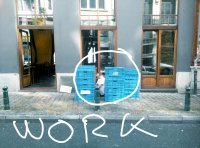 © Claudia Bosse
© Claudia BosseFor her three-part salon ‘Let’s talk about work, honey!’, the choreographer Claudia Bosse invited practitioners from different artistic disciplines to joint work sessions. Choreographers meet filmmakers and dramaturges meet performers in an installative setting to examine similarities and differences between their specific working methods based on not yet completed works. The incomplete works are set in relation to each other to discuss the paradigms of contemporary art-making practice in various socio-political contexts. Under what conditions is art produced today, or more specifically, how do the conditions of production in countries such as Germany and Austria differ from those in Egypt and Greece? Which structures must be resisted on a transnational level? And is a political moment of contemporary choreography revealed in this potential resistance?
Salon, Workshop
as well as:
Fri 17 June, 16:00 – 18:00 Part I
Sat 18 June, 17:00 – 19:00 Part IIIKaya Behkalam (DE/EG) filmmaker, artist (instead of Doa Aly)
Claudia Bosse (DE) artist, choreographer
Anna Etteldorf (AT) project coordinator
Ismail Fayed (EG) author, scholar
Adania Shibli (PS/DE) author (instead of Tzeni Argyriou)
Filippos Tsitsopoulos (GR) artist
Arkadi Zaides (IL) choreographer -
14:00 - 16:30 Oper - Probebühne 2
The physicality and performativity of bordering processes
Workshop © Khaled Jarrar
© Khaled JarrarIn their dialog, theatre scholar Kristin Flade and artist Khaled Jarrar react on mass movements and the movements of the mass that we can observe in situations of crises and conflict. They explore the physicality and performativity of bordering processes, and ask: What kind of knowledge and tools do movement and physical experience provide in order to understand, represent, legitimize, challenge, rehearse and aestheticize borders? How do presence and effect, discipline, empathy and sensing come into play and how are they used and displayed in bordering processes? How is identity physically created, rehearsed, recognized and destructed?
as well as:
Impulse
Fri 17 June, 14:00 – 15:00, Schauspiel – Bühne
In English with simultaneous translationKristin Flade (DE) theatre scholar, author
Khaled Jarrar (PS) filmmaker, artist -
14:00 - 17:00 Künstlerhaus - Jo-Jo Saal
De-Colonizing Dance: Postcoloniality and Contemporaneity
Part II
(Dance) Art from African countries is 'en vogue'. Due to a remarkable number of funding programmes, the market for artistic coproduction projects between African and German artists is booming. One of the most frequent application criteria is to develop a concept based on 'equal cooperation.' Yet 'cooperation' beyond the formal performance of one's duties can only arise, if (post-)colonial imaginations are radically called into question and made an issue. The question is what cooperation looks like – in both political and artistic terms. What are the aesthetic and discursive practices of (dance) cultural translation? What does the concept of 'contemporary' mean in the context of global and postcolonial dance cultures? Together with the choreographers Germaine Acogny (Senegal) and Mamela Nyamza (South Africa), participants can test an applied discourse on the decolonization of dance within the frame of a research lab.
Research lab
Registration requiredas well as:
Part I
Sat 18 June, 10:00 - 13:00, Künstlerhaus - Jo-Jo SaalGermaine Acogny (SN) choreographer, dancer
Claude Jansen (DE) dance scholar
Gabriele Klein (DE) dance scholar, sociologist
Mamela Nyamza (ZA) choreographer, dancer -
14:00 - 18:00 Oper - Marschnersaal
Embodying the political
The past years have seen an increased discussion on the political in the performing arts, not least since the Belgian political scientist Chantal Mouffe wrote about a new type of artist-activist, the so-called artivist. According to Mouffe, the actions of the artivists dissolve the fixed distinction between art and politics, and interventions in public space replace distanced critique. the lab seeks to critically examine this proposition. To this end, internationally operating, politically active artists will present their approaches based on their own documented actions and discuss questions related to the political in art. The art-activist John Jordan (labofii) meets the artist Rima Najdi, and the dramaturge Ivana Ivkovic ́ meets choreographer Andrea Božic ́.
Research lab
Andrea Božić (HR/NL) choreographer
Jan Deck (DE) director, dramaturge, curator
Ivana Ivković (RS) dramaturge
John Jordan (UK) art-activist
Rima Najdi (LB/DE) artist
Sat 18 June 15:00
-
15:00 - 18:00 Oper - Kleiner Ballettsaal
Actions of Nothingness
Is nothingness really ultimate formlessness? Can concepts of nothingness set a thinker in motion? Can the indeterminate, the undefinable become the occasion and cause of performative discoveries? What could a contemporaneity mean that examines non-action and the questions of the substance of non-being, thus locating itself at the ‘fringes of nothingness’, so to speak? In this workshop, the Viennese artists’ collective SOMEX, which conducts research on somatic methods in regard to their participatory applicability, explores together with the participants which figures of thought and movement can be developed around the concept of nothingness. ‘Nothingness’, ‘emptiness’, ‘absence’ are defined and assessed in completely different ways in various European and non-European cultures. The participants will reflect on these differences in practice and discourse, and approach the dialectics of ‘something’ and ‘nothing’, of action and non-action, as well as the semantic fields of nothingness and their resonance in choreography and movement.
Embodied discourse, Somatic workshop
Registration required
Please bring comfortable clothesMariella Greil (AT) performer, choreographer
Kerstin Kussmaul (AT) movement researcher, choreographer, teacher
Sylvia Scheidl (AT) performer, teacher -
15:00 - 18:00 Oper - Physioraum
Nutrition, training and prevention
The consultations in dance medicine serve to comprehensively prevent injuries, to provide information and insights, and to develop an awareness of body-appropriate training and the potential risks lying in one's everyday professional work. They additionally promote the engagement with themes of dance medicine in the sense of personal further education and self-care, and offer the opportunity to establish networks with experts in medicine, therapy, and training.
In individual appointments, dancers, dance professionals, and pedagogues of all disciplines can seek free advice on topics from the areas of nutrition, training, and prevention by tamed, Tanzmedizin Deutschland e.V.Anja Hauschild gives advice on health problems related to dancing, dance-(style)-specific and individual risk factors, and the prevention of dance injuries.
(Saturday 15:00-15:30 & 16:30-17:00 / Sunday 10:00-10:30, 11:30-12:00 & 13:00-13:30)
Eva-Maria Kraft gives advice on questions related to healthy and performance-enhancing nutrition for dancers and dance professionals.
(Saturday 16:00-16:30 & 17:30-18:00 / Sunday 11:00-11:30 & 12:30-13:00)
Andreas Starr gives advice on issues having to do with the planning, design, and control of training.
(Saturday 15:30-16:00 & 17:00-17:30 / Sunday 10:30-11:00, 12:00-12:30 & 13:30-14:00)Consultation 30 min. each
Registration required
Sat 18 June, 15:00 - 18:00, Oper - Physioraum
Sun 19 June, 10:00 – 14:00, Oper - PhysioraumAnja Hauschild (DE) physician, dancer, board member of tamed
Eva-Maria Kraft (AT) nutrition trainer, dance pedagogue, dancer
Andreas Starr (AT) dance pedagogue, dancer
Sat 18 June 16:00
-
16:00 - 17:30 Schauspiel - Bühne
Funding practices: Keeping with the times?
In which way do the economisation and acceleration of work processes influence the funding of art? Must creative work follow the structures of funding, or what could a funding look like in which the critical potential of art and artistic freedom can unfold? From the practice-oriented perspective of dance professionals, this panel focuses on the possibilities of a funding that keeps with the times. It raises questions as to existing models, obstacles and progress on the path to strengthening dance funding in a coordinated way between federal, state and local institutions. How can this funding be rethought in order to do justice to the current needs of a constantly changing art scene?
Discussion
In German, with simultaneous translationVera Battis-Reese (DE) Dresden Frankfurt Dance Company
Janina Benduski (DE) Bundesverband Freie Darstellende Künste
David Brandstätter (DE) shifts\art in movement
Kerstin Evert (DE) K3 – Centre for Choreography
Michael Freundt (DE) Dachverband Tanz Deutschland
Helge Letonja (DE) steptext dance project
Bettina Masuch (DE) tanzhaus nrwIn cooperation with Dachverband Tanz Deutschland.
-
16:00 - 17:30 Cumberlandsche Bühne
Who's the party now sister?: Visible Acts
 © Michiel Keuper
© Michiel KeuperNumerous works by feminist artists of the past have long been forgotten by the public and in dance historiography. The performers Sheena McGrandles, Winnie Ho, Joy Mariama Smith, and Tove Sahlin dedicate their live interventions and actions during the Dance Congress to the invisible, forgotten, or even censored performances of feminist artists in order to make us aware of them again.
Following the traces of lost memories, they play with forms of reappropriation or backtracking. A lecture by the curator Bettina Knaup as well as a talk of the four performers with the Berlinbased collective Female Trouble supplement and contextualize the debate: In which way can the historical view of feminist art shed new light on today's understanding of the political and also on the current situation of dance and performance art?Lecture, Talk, Artistic intervention
Winnie Ho (CN) dance performance artist
Roni Katz (DE) performer, Female Trouble collective
Bettina Knaup (DE) cultural producer, scholar
Sheena McGrandles (DE) choreographer, performer
Tove Sahlin (SE) performer, choreographer
Agata Siniarska (DE) performer, Female Trouble collective
Joy Mariama Smith (US/NL) artist, activist, curator
Xenia Taniko Dwertmann (DE) performer, Female Trouble collective
Britta Wirthmüller (DE) choreographer, dancer -
16:00 - 18:00 Künstlerhaus - Kino
The live legacy project - film documentation
Ein TANZFONDS ERBE Projekt
© Tim Richards
The large-scale research project 'The Live Legacy Project' by the Hamburg-based choreographer Angela Guerreiro explores the connections between the Judson Dance Theater Movement in New York and contemporary dance in Germany. Through numerous channels, among others, Dutch educational institutions, and the influence of a number of personalities, the radical ideas and new aesthetic forms of the American avant-garde found their way to the German dance landscape and dance training in the 1960s. During a six-day symposium at tanzhaus nrw in July 2014, choreographers, dancers, students, and teachers exchanged thoughts on various influences and brought dance history to life in the frame of 60 workshops, lectures, and talks. Angela Guerreiro and her project collaborator Karen Schaffman will premiere the film documentation of the symposium produced by German Dance Film Institute Bremen.
Angela Guerreiro (DE) curator, producer, teacher, dancer, choreographer
Karen Schaffman (US) dance artist, professor, curatorThe Live Legacy Project is funded by TANZFONDS ERBE – an initiative of the German Federal Cultural Foundation.
-
16:00 - 18:30 Oper - Großer Ballettsaal
Choreography and conflict
Workshop © Marion Borriss
© Marion Borriss‘Conflict is not only a place of possibility, but the origin of all creative action.’ (Dana Caspersen)
This focus takes interest in how conflict and crisis challenge and are challenged by choreography as a practice and a conceptual framework. In her lecture and workshop, the dancer and conflict specialist Dana Caspersen focuses on the power of the individual to affect positive change in destructive systems. This interactive event offers participants a glimpse into the physicalized methodologies that Caspersen has developed for learning, experiencing and creating change in conflicts ranging from inter-personal to international. The impulse lecture by choreographer and performer Arkadi Zaides draws on his artistic work on the political and social situation in Israel/Palestine. By engaging in physical reactions and actions, which result in confrontational situations, he poses critical questions of participation and responsibility in his artistic practice.
as well as:
Impulse
Sat 18 June, 10:00 - 11:00, Schauspiel - Bühne
In english with simultaneous translationDana Caspersen (US) conflict specialist, author, performing artist
-
16:00 - 18:30 Schauspiel - Probebühne
The Body's agency in bordering processes
WorkshopThe relation between artistic and social as well as civic and political movements and practices has been formative for the field of choreography as well as the field of border studies. The dancer Chrysa Parkinson and the philosopher Tomislav Medak dedicate their contribution to the question of the body's agency in bordering processes. Chrysa Parkinson proposes to look at a border that is created in every artistic process: the border between the creation of movement and its appropriation or reproduction. Tomislav Medak will discuss examples of how dance developed within capitalist modernity: While the bodies of workers were subjected to the discipline of machines, modern dance constituted its claim to autonomy around the expressive capacities of a freed body. The contribution follows the assumption that dance today faces the challenge of establishing a distance to the binary understanding of an 'inside' and 'outside' and newly seek resistance.
as well as:
Impulse
Sat 18 June, 11:30 – 12:30, Schauspiel – Bühne
In English with simultaneous translationTomislav Medak (RS) philosopher, artist
Chrysa Parkinson (SE) dancer
Sat 18 June 17:00
-
17:00 - 17:45 Kunstverein
Private: Wear a Mask when you talk to me
For the first time, the Kunstverein Hannover features a comprehensive cross-section of the installational works by the dancer, choreographer and fine artist Alexandra Bachzetsis. The point of departure of Bachzetsis' works is formed by codes that have an influence on movement. Inspired by gestures and expressions of popular, high and low culture, many of her pieces explore how we – consciously or unconsciously – invent our bodies and identities in ever new ways.
In the performance 'PRI VATE ' from 2016, Bachzetsis creates collages of different genres and dance styles: from erotic posing, to gymnastic elements and yoga exercises, all the way to pop citations. Seeing and being seen as well as masquerades (of everyday life) are addressed in this multifaceted piece, as is the audience itself as a vis-à-vis and constitutive element of the performance situation.Performance
In the context of the international exhibition project 'Bodies and Stages' at the
Kunstverein Hannover
Alexandra Bachzetsis (CH) artist, choreographer -
17:00 - 19:00 Schauspiel - Theatermuseum
Let's talk about work, honey!
Part III © Claudia Bosse
© Claudia BosseFor her three-part salon 'Let's talk about work, honey!', the choreographer Claudia Bosse invited practitioners from different artistic disciplines to joint work sessions. Choreographers meet filmmakers and dramaturges meet performers in an installative setting to examine similarities and differences between their specific working methods based on not yet completed works. The incomplete works are set in relation to each other to discuss the paradigms of contemporary art-making practice in various socio-political contexts.
Under what conditions is art produced today, or more specifically, how do the conditions of production in countries such as Germany and Austria differ from those in Egypt and Greece? Which structures must be resisted on a transnational level? And is a political moment of contemporary choreography revealed in this potential resistance?Salon, Workshop
as well as:
Fri 17 June, 16:00 – 18:00 Part I
Sat 18 June, 14:00 – 16:00 Part IIKaya Behkalam (DE/EG) filmmaker, artist (instead of Doa Aly)
Claudia Bosse (DE) artist, choreographer
Anna Etteldorf (AT) project coordinator
Ismail Fayed (EG) author, scholar
Adania Shibli (PS/DE) author (instead of Tzeni Argyriou)
Filippos Tsitsopoulos (GR) artist
Arkadi Zaides (IL) choreographer
Durational
-
Theaterhof
Ausdruck-Mobil
 © MS Schrittmacher
© MS SchrittmacherThe choreographer Martin Stiefermann and his company MS Schrittmacher have been searching for traces of more than 30 Ausdruckstanz-dancers from the 1920s, 1930s, and 1940s. The ‘Ausdruck-Mobil’ gives the congress participants information on where the today often unknown dancers ended up after fleeing from the national socialists, and which paths they took while emigrating. the caravan designed by MS Schrittmacher features an extremely haptic reconstruction of the flight routes as well as tables, information material, videos, sound installations, and an animated online presentation showing which artistic inspirations the Ausdrucktanz dancers spread throughout the world and the influences they later brought back to Germany. Interesting information can be printed out in the ‘Ausdruck-mobil’, sent by email upon request, or gained directly on site from the research team.
Installation, research, choreography Martin Stiefermann
Dancers in the videos Brit Rodemund, Efrat Stempler, Johanna Lemke
Sound design Albrecht Ziepert
Video Willi Neumann
Digital illustration Carolin Schultz
Research assistants Antje Maria Lossin, Alisa Beckstein
Editing, text work Hartmut SchreweAn installation by MS Schrittmacher. Produced in the frame of the Festival POST – Ausdruckstanz in Israel, Deutschland und im Butoh at Dock 11 Berlin 2015. Funded by the Capital Cultural Fund and supported by 50 Jahre Deutschland Israel
-
Künstlerhaus
Books on the move
Bookstore on the road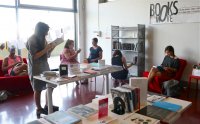 © Stephanie Pichon
© Stephanie PichonGuest of the Dance Congress: the mobile bookstore for everyone who dances, reflects and moves. The assortment of this international bookstore for contemporary dance and performance includes books on choreography, applied anatomy and body experience, as well as theoretical essays and biographies in German, English and French. New publications are on offer as well as hard-to-find books on contemporary dance.
Agnès Benoit (FR) dancer
Stéphanie Pichon (FR) journalist -
Kunstverein
Bodies and Stages
The international exhibition project ‘Bodies and stages‘ at the Kunstverein Hannover casts an associative view to the intersections of performance, dance and fine art. With installations and performances, the artists Alexandra Bachzetsis, Vaginal Davis, Adam Linder, and Shahryar Nashat explore various ways of presenting the body in space. Displays, filmic works and live interventions question how people present themselves to others and which poses they strike in daily life and in the frame of artistic (self-)staging. How do we present ourselves to the other, to the outside world? What does self-presentation mean in an exhibition context or on the stage? The artistic approach to these questions quite naturally crosses the borders between the arts.
11. Juni – 28. August 2016
Opening hours
Tue – Sat, 12:00 – 19:00
Sun, 11:00 – 19:00
Kunstverein HannoverAdmission free for congress participants
Guided tours
Fr 17. Juni, 15:00 – 16:00
Kathleen Rahn director Kunstverein HannoverSo 19. Juni, 14:00 – 15:00
Regular guided tourSo 19. Juni, 15:00 – 16:00
Dialogführung dialogic tour
Jörg Mannes ballet director Staatsoper Hannover
Kathleen Rahn director Kunstverein HannoverFunded by German Federal Cultural Foundation, Stiftung Niedersachsen, Ministry for Science and Culture of Lower Saxony, State Capital Hannover and Pro Helvetia/Schweizer Kulturstiftung.
-
Künstlerhaus
Transition - Dance of Life
PhotoexhibitionKarine Seneca stands all alone on the huge black stage. This is a scene from the rehearsals for 'Madame Bovary' at the Staatsoper Hannover. She finished her career as a ballet dancer playing the role of Emma Bovary. The time for her last premiere, the last dance in Hanover and her very last performance had come. 'A lonesome moment', says Karine about the moment the curtain fell for the last time.
For the then 40-year-old, this was a time filled with great tension, the pressure to achieve and great expectations, but also with her own feelings of farewell, insecurity and reorientation. She began her career as a member of the Basler Ballett at the age of 17. After performing with the Deutsche Oper am Rhein, the Züricher Ballett and the Boston Ballet, she went to Hanover in 2008. But a lot has changed. The steps have become more difficult, the joints are worn. Pain that will never cease again. A guest performance in Heilbronn brings the season to an end, and with it dancing on pointe for Karine Seneca. The abrupt end of a career in the middle years of one’s life. How does it feel when one’s entire life consists of dance that now comes to an end?
The photographer Insa Cathérine Hagemann accompanied the ballet dancer Karine Seneca for a period of two years (from 2012 to 2014), from the rehearsals for her last leading role back to her hometown of Cannes. A selection of these highly personal portraits is on view at the Künstlerhaus during the course of the Dance Congress 2016.Insa Hagemann (DE) photographer
Transition - dance of life from Insa Cathérine Hagemann on Vimeo.